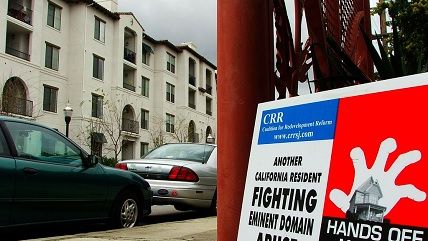A California Bill Trump the Developer Would Love
Would make using eminent domain even easier.

I love when the powerless get fed up with a corrupt establishment, defy political correctness and fight back. It's why I've admired Vera Coking, the feisty widow from Atlantic City, New Jersey, who stood up to Donald Trump and the city's development authority in the 1990s. They tried to use eminent domain—the power to take property by force—to bulldoze her house and turn it into a parking lot for Trump Plaza limousines.
"He's a maggot, a cockroach and a crumb, that's what he is," Coking said in a 1998 interview. She beat him in court and lived in the house for another decade before moving out West. According to the Washington Post, she was there as Trump's now-closed casino fizzled. It's great when the little guy wins a round.
Without getting into presidential politics, I'll admit to having never given the presumptive GOP nominee a fair hearing. Anyone who thinks it's a good thing to take people's property forcibly for such uses isn't worth my consideration.
Trump insists victims often get far more than the property is worth: "Most of the time, they just want money," he said. "It's very rarely they say, 'I love my house, I love my house, it's the greatest thing ever.'" Yet Coking proves Trump wrong. She rejected his offers precisely because she wanted to stay. He turned to the government because he wanted his way.
When eminent domain is invoked, the government is generally not allowed to pay above market value. Cities invoke it to strong-arm people into doing what the powerful want them to do. Owners often can't afford the legal costs. Cities often offer pennies on the dollar, and the long drawn-out process takes its toll. I've interviewed victims for my Orange County-based book on the topic. It's an evil.
In California, the issue is closely linked to the state's 1940s-era redevelopment agencies, which were designed to combat urban blight. They would float debt to subsidize development in targeted areas, but found it more lucrative to subsidize malls, car dealerships, movie theaters and hotels. Eminent domain was a key tool in the agencies' arsenal.
Gov. Jerry Brown (D) ended redevelopment agencies in 2011, but not out of apparent concern about eminent domain abuse. In a fiscal crisis, Brown found he needed funding and redevelopment siphoned off 12 percent of the general-fund budget. As the budget improved, he has allowed a facsimile of these agencies to creep back to life.
In 2014, Brown signed a law that creates Enhanced Infrastructure Financing Districts—like redevelopment, but limited to infrastructure. Last year, he signed Assembly Bill 2, which expands the process to urban renewal. It has more limits than redevelopment (all affected districts must agree to the tax diversion, for instance), but the new laws did not restrict eminent domain. Now, Assembly Bill 2492 is moving through the Legislature.
It is billed as "clean up" legislation for AB2, but "will expand the number of communities and neighborhoods in which the government can exercise its power to forcibly seize private property from unwilling sellers," wrote the California Alliance to Protect Private Property Rights. The group refers to the bill as the "Donald Trump 'Wonderful' Land Grab Bill."
That's a reference to Trump's interview with Fox News last October, in which he said, "I think eminent domain is wonderful—if you're building a highway and you need to build, as an example, a highway and you're going to be blocked by a holdout… and you need a house in a certain location because you're going to build this massive development that's going to employ thousands of people."
Yes, the Constitution allows eminent domain for some limited and genuinely public uses, such as building a highway. But the U.S. Supreme Court's Kelo decision in 2005 deemed it acceptable for government to take property not just for public "use," but for public "benefit," which is a disturbingly open-ended concept.
"Any property may now be taken for the benefit of another private party, but the fallout from this decision will not be random," wrote Justice Sandra Day O'Connor in her dissent. "The beneficiaries are likely to be those citizens with disproportionate influence and power in the political process… As for the victims, the government now has license to transfer property from those with fewer resources to those with more."
Trump now has other things on his mind than seizing the property of little people who stand in the way of his developments. But the Democratic Legislature ought to think twice before passing something that empowers people like him.
